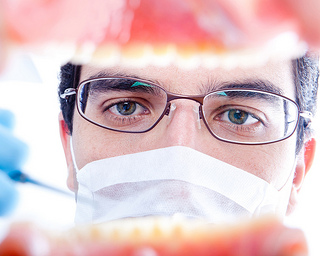December 31st, 2025

The beginning of a new year is the perfect opportunity for a fresh start for you and your smile. At Dentistry for Children, a brighter smile is quick and easy!
Given the latest in whitening technology, whiter teeth are only an appointment away. Teeth whitening is a safe, quick, and inexpensive way to create the dream smile you’ve always desired. We can offer a safe method that corrects tooth discolorations that may have been caused by staining, aging, or chemical effects.
So, start the new year off right and get a whiter smile today! Give us a call at our convenient Creve Coeur or St. Charles office to schedule an appointment!
December 24th, 2025

What’s in your carry-on bag? You’ve got your passport, ticket, and currency, but what about dental floss? Of course! You’re preparing for the trip of a lifetime, and we want to help make sure everything goes according to plan.
Part of your preparation before a long vacation should be a complete check-up at our Creve Coeur or St. Charles office well in advance of your trip. If there is dental work to be done, now is the time to do it. No one wants to be stuck over the Atlantic with a toothache, and changes in atmospheric pressure can cause serious problems if you have a severely compromised tooth. Tell us when you are planning on traveling, and we can schedule any procedures that should be finished before you fly.
Now that you have the all clear to travel, what about maintenance once you’re on board for a long flight? Some airlines provide toothpaste and brushes for travelers. If you have questions about the quality of the water in the airplane restroom, use bottled water to brush. There are also single-use mini-brushes available for travelers that come loaded with paste and ready to use without any water at all. Crisp fruits and vegetables can help clean teeth on-flight if brushing isn’t an option, and drinking plenty of water will not only keep you hydrated, but help cleanse your mouth and teeth as well. Be sure to travel with floss, a travel-sized tube of toothpaste, and a brush in a well-ventilated container in case you face airport delays between flights.
Taking your electric toothbrush with you? Usually there is no problem bringing your electric toothbrush in your carry-on, but do check in advance to make sure this is allowed on your flight. Most electric toothbrushes have region-specific battery chargers, so find out in advance if you will need a voltage converter or plug adaptor if you are visiting another country. Check to make sure the head is in good condition before you go and replace it if necessary.
Once you’ve landed, try to keep your dental routine as close to normal as possible while you enjoy your visit. Regular brushing and flossing are still necessary, especially if you take the opportunity to explore the local desserts. We’ve given you some tips to make your flight more comfortable—now that you’ve reached your dream destination, the rest is up to you!
December 17th, 2025

Do you have a space where a tooth used to be? Were you born with a missing tooth? Are you getting ready for dentures? You may be a good candidate for a dental implant. Metal dental implants were invented in 1965. Technology continues to advance with millions of implants placed in the United States and Canada. Placing implants has become mainstream and a common practice for offices like ours.
A dental implant is a small titanium post, which resembles a screw with threads. The post also has holes for bone to integrate. A dental implant is placed into the jawbone during a short dental procedure. It is relatively painless with very little post-operative pain. The threads on the implant post allow for the bone to fill in and integrate. To facilitate this process the implant is re-covered with gum tissue and allowed to heal and integrate for nearly three months. The implant acts as the root for the tooth to provide solid and stable support for the crown that’s yet to be placed.
The next step in the dental procedure is to uncover the implant and place a healing cap to allow the gum tissue to heal. After a short period of healing, an impression is taken to fabricate a crown to fully restore the missing tooth. The crown is then cemented on top of the post, at which point you can resume normal eating activities.
Dental implants do require some special care, but that is easily managed when you follow the directions outlined by Dr. Varble, Dr. Dill, and Dr. Wong. During your regularly scheduled cleaning, special instruments are used to clean implants. While a dental implant cannot get a cavity, a condition known as peri-implantitis can occur. This is very similar to periodontal disease as the end result is dental implant loss and loss of bone structure. Be sure to floss the dental implant daily and run the floss under the implant crown as far as it can go to remove food and plaque. If you use any picks or small brushes to go in between your teeth, make sure they are plastic. Metal will scratch the implant making it more susceptible to infection. Be sure to keep your regular dental visits and cleanings to monitor the implant and help preserve your investment.
December 10th, 2025

TMD occurs when your bite is not properly aligned. It can cause the jaw to experience unnatural stresses and prevent it from resting properly when your mouth is closed. If you have TMD, you may have noticed a clicking noise when you chew, speak, or yawn; you may even experience pain and discomfort during these actions. In some cases, your jaw may feel “locked” following a wide yawn.
TMD can cause pain and discomfort in the jaw as well as headaches that occur when the muscles that help the joints open and close become overtired. But beyond the pain and discomfort, TMD can also cause serious dental problems if left untreated.
Because TMD is associated with a poor bite or malocclusion (which literally translated means “bad closure”), your teeth do not meet properly. As a result, extra tension and stress may be placed on your teeth, resulting in chips and cracks that allow cavities to form and may even result in tooth loss. Over time, TMD can cause teeth to break, which requires cosmetic treatment to rebuild your healthy smile, and ensure the broken tooth and its neighbors are protected from decay.
While treating TMD used to mean expensive and invasive surgery to reposition or even rebuild the jaw joints, today’s approach at Dentistry for Children is much more patient-friendly. By restoring broken, chipped, or cracked teeth, replacing missing teeth, and using braces or other dental devices, Dr. Varble, Dr. Dill, and Dr. Wong and our team can help realign your jaw so it’s able to function properly, and eliminate pain and discomfort. And there’s more good news: By restoring damaged teeth and tooth surfaces and straightening crooked teeth, you’re also left with a more attractive smile once treatment is completed.
Every patient is different, and that means your course of treatment will be different too. After a thorough examination of your teeth and jaw, our experienced staff at Dentistry for Children will work with you to develop a treatment plan that will have you feeling better – and looking better – sooner than you ever expected. Don’t let your untreated TMD cause more pain and problems; give us a call at our convenient Creve Coeur or St. Charles office today to schedule a consultation.







